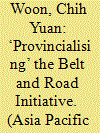| Srl | Item |
| 1 |
ID:
182694


|
|
|
|
|
| Summary/Abstract |
This paper reflects on how the Belt and Road Initiative (BRI) can contribute to more cosmopolitan forms of theory-making and the diversification of knowledges. It focuses on emerging Chinese narratives of the Digital Silk Road (DSR) that cast the initiative as emblematic of an improved BRI 2.0 in the (post-)pandemic era. With subterranean fibre-optic cables and satellite systems constituting important components of the DSR, I argue that these Chinese discourses fundamentally expose the ‘horizontal’ bias in infrastructure debates, thereby forcing an analytical re-orientation towards the notion's volumetric possibilities. Reconceptualising infrastructures in volumetric terms opens up opportunities for interrogating issues of representational politics, power and sovereignty that matter for the DSR and beyond. Using Chinese perspectives of the DSR for the purpose of theory-building, however, does not equate to endorsing Sinocentrism or privileging the BRI as a totalising framework for interpreting the world. Rather, it signifies an effort to ‘provincialise’ the BRI – ensuring that different voices and subjectivities can co-exist in the ongoing and unfinished project of rethinking/reconstructing the BRI.
|
|
|
|
|
|
|
|
|
|
|
|
|
|
|
|
| 2 |
ID:
159969


|
|
|
|
|
| Summary/Abstract |
Eurocentrism in the analysis of European foreign policy often renders scholars blind to other world views and realities, although engaging with these may be critical for understanding the relevance and impact of this policy in other parts of the world. Notwithstanding calls for decentring the study of International Relations and European foreign policy in particular, scholars of European foreign policy generally lack the tools and conceptual lenses to overcome Eurocentrism in their analyses. This article proposes an analytical framework to systematically open up for difference, and to see and understand dynamics and realities that go beyond dominant Eurocentric accounts, while trying to avoid the pitfalls of simplification and knowledge fragmentation. The framework consists of six partially overlapping decentring categories – spatial, temporal, normative, polity, linguistic, and disciplinary decentring – and is developed through two dimensions of the Decentring Agenda proposed by Fisher Onar and Nicolaïdis: ‘provincialising’ (questioning Eurocentric perspectives) and ‘engagement’ (learning from other perspectives). In this way, this article aims to support scholars of European foreign policy in overcoming Eurocentrism and in operationalising the Decentring Agenda.
|
|
|
|
|
|
|
|
|
|
|
|
|
|
|
|